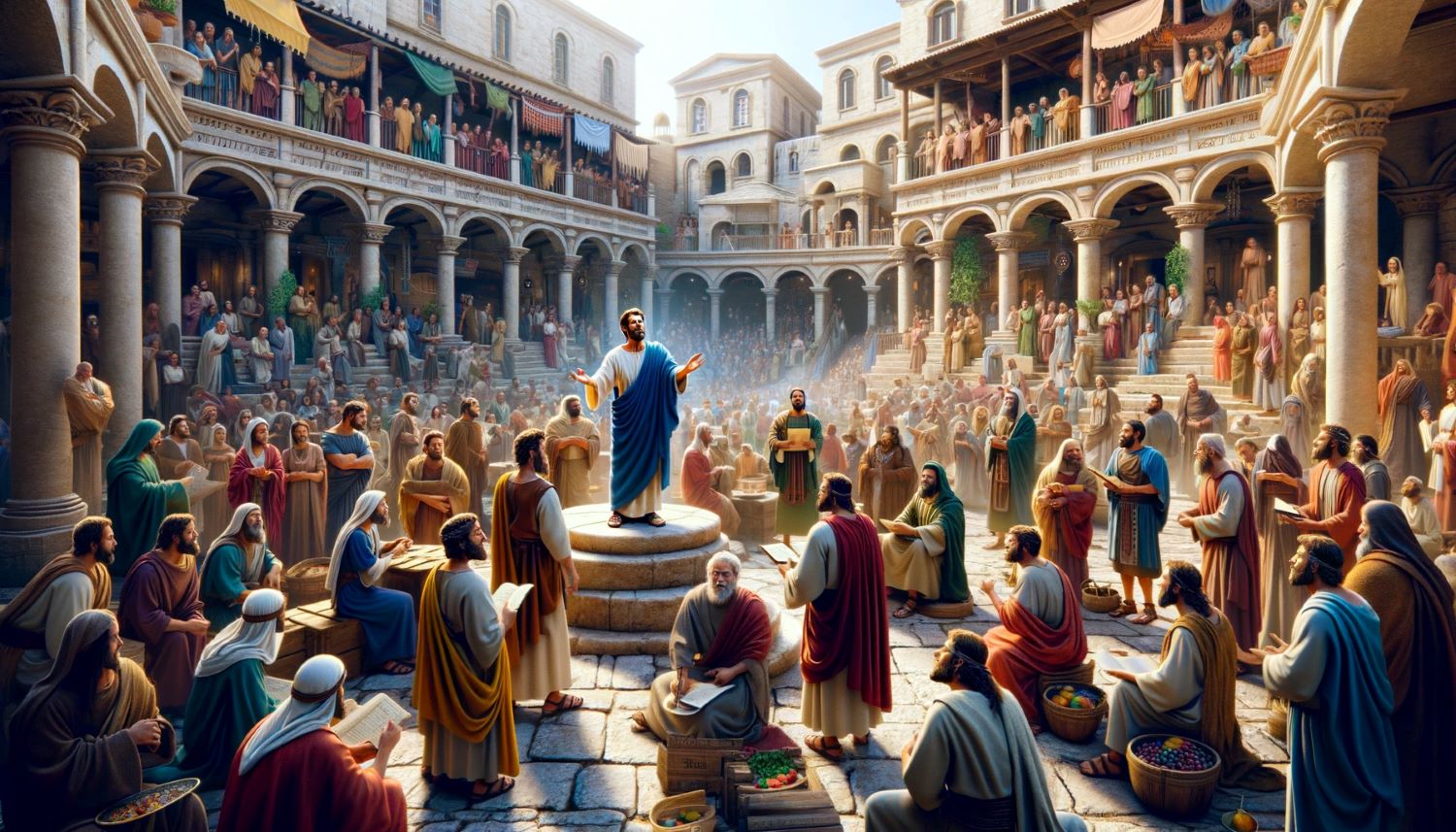Home>Bible Facts>What Did Jesus Commission His Apostles To Do


Bible Facts
What Did Jesus Commission His Apostles To Do
Published: February 22, 2024
Jason DeRose, Managing Editor at Christian.net, uses his expertise in religion and journalism to deepen understanding of faith's societal impacts. His editorial leadership, coupled with a strong academic background, enriches the platform’s diverse content, earning him recognition in both journalism and religious circles.
Discover the essential Bible facts about Jesus commissioning his apostles and their mission. Explore the significance of their divine calling and teachings. Gain a deeper understanding of their role in spreading the gospel.
(Many of the links in this article redirect to a specific reviewed product. Your purchase of these products through affiliate links helps to generate commission for Christian.net, at no extra cost. Learn more)
Table of Contents
Introduction
The commissioning of the apostles by Jesus Christ is a pivotal moment in the Christian faith, marking the transition from Christ's earthly ministry to the spread of the Gospel to all nations. This divine charge, known as the Great Commission, embodies the core mission of the Christian church and serves as a guiding principle for believers worldwide. It encapsulates the essence of evangelism, discipleship, and the proclamation of God's redemptive plan for humanity.
The Great Commission, as recorded in the Gospel of Matthew 28:18-20, represents a profound mandate from Jesus to His disciples, empowering them to carry forth His teachings and extend the reach of His transformative message. This charge is not confined to the apostolic era but resonates across generations, compelling Christians to actively participate in the fulfillment of this sacred directive.
At its core, the Great Commission embodies the universal call to share the Good News of salvation, inviting individuals from all walks of life to embrace the hope and redemption found in Jesus Christ. It underscores the inclusive nature of the Gospel, transcending cultural, geographical, and societal boundaries to reach every corner of the earth.
The significance of the Great Commission extends beyond mere instruction; it reflects the heart of God for humanity, encapsulating His desire for all people to experience the life-changing power of His love and grace. As such, it serves as a catalyst for believers to engage in purposeful evangelism, recognizing the eternal impact of sharing the message of salvation with others.
Furthermore, the Great Commission ignites a passion for discipleship, emphasizing the transformative journey of nurturing and equipping individuals to become devoted followers of Christ. It underscores the importance of investing in the spiritual growth and development of believers, fostering a community of faith grounded in the teachings of Jesus.
In essence, the Great Commission stands as a timeless call to action, compelling believers to actively participate in the advancement of God's kingdom on earth. It serves as a unifying force, uniting Christians in a shared mission to proclaim the Gospel, make disciples, and demonstrate the love of Christ to a world in need of hope and redemption.
The Great Commission
The Great Commission, as articulated in the Gospel of Matthew 28:18-20, represents a defining moment in the ministry of Jesus Christ. Following His resurrection, Jesus gathered His disciples and imparted to them a profound mandate that would shape the course of Christian history. This commission, often referred to as the Great Commission, embodies the essence of Christ's redemptive mission and serves as a foundational directive for believers worldwide.
At the heart of the Great Commission is the charge for disciples to go forth and make disciples of all nations. This universal call to evangelize transcends geographical, cultural, and societal boundaries, emphasizing the inclusive nature of the Gospel message. It underscores the transformative power of Christ's teachings, compelling believers to share the Good News with individuals from every corner of the earth.
Moreover, the Great Commission encapsulates the authority bestowed upon the disciples to proclaim the message of salvation, inviting individuals to embrace the hope and redemption found in Jesus Christ. It signifies the extension of Christ's ministry beyond the confines of His earthly presence, empowering His followers to continue His work of reconciliation and restoration.
Central to the Great Commission is the imperative to baptize believers in the name of the Father, Son, and Holy Spirit, symbolizing their identification with the triune God and their commitment to a life of discipleship. This act of baptism signifies the initiation of individuals into the community of faith, marking the beginning of their journey as followers of Christ.
Furthermore, the Great Commission underscores the significance of teaching and obeying God's commands, emphasizing the vital role of discipleship in nurturing and equipping believers for a life of faithful obedience. It calls for a holistic approach to spiritual formation, encompassing both the proclamation of the Gospel and the ongoing mentorship and instruction essential for the maturation of disciples.
In essence, the Great Commission stands as a timeless mandate, compelling believers to actively engage in the proclamation of the Gospel, the making of disciples, and the demonstration of Christ's love to a world in need. It serves as a unifying force, uniting Christians in a shared mission to advance God's kingdom and extend the transformative message of salvation to all humanity.
Preaching the Gospel
Preaching the Gospel lies at the heart of the Great Commission, embodying the foundational directive for believers to proclaim the transformative message of salvation to all nations. It represents the act of sharing the Good News of Jesus Christ, inviting individuals to embrace the hope and redemption found in His sacrificial death and resurrection.
The essence of preaching the Gospel extends beyond mere verbal communication; it encompasses a demonstration of Christ's love through both words and actions. It involves articulating the central tenets of the Christian faith, including the universal need for salvation, the redemptive work of Jesus Christ, and the promise of eternal life through faith. This proclamation serves as a catalyst for spiritual awakening, compelling individuals to consider the profound implications of embracing the message of the Gospel.
Preaching the Gospel is characterized by a sense of urgency, recognizing the temporal and eternal significance of the message being conveyed. It calls for boldness and conviction, as believers are entrusted with the task of heralding the life-changing power of Christ's love and grace. This proclamation transcends cultural and linguistic barriers, resonating with the human heart irrespective of geographical or societal distinctions.
Moreover, the act of preaching the Gospel underscores the transformative impact of Christ's message, igniting a sense of hope and purpose in the lives of those who encounter it. It serves as a beacon of light in a world marked by darkness, offering a pathway to reconciliation with God and restoration to a broken and hurting humanity.
The mandate to preach the Gospel is not confined to ordained ministers or evangelists; rather, it is a collective responsibility entrusted to all believers. Each individual is called to be a living testimony of the Gospel, reflecting the love and compassion of Christ in their interactions with others. This holistic approach to sharing the Good News encompasses both verbal proclamation and a lifestyle characterized by the values and principles espoused in the teachings of Jesus.
In essence, preaching the Gospel embodies the essence of the Great Commission, compelling believers to actively engage in the proclamation of the transformative message of salvation. It serves as a powerful expression of God's redemptive plan for humanity, inviting individuals to embrace the hope and restoration found in a personal relationship with Jesus Christ.
Making Disciples
Making disciples is at the core of the Great Commission, signifying the transformative journey of nurturing and equipping individuals to become devoted followers of Christ. This profound directive extends beyond the initial proclamation of the Gospel, emphasizing the ongoing process of spiritual formation and mentorship essential for the maturation of believers.
The concept of making disciples encompasses the holistic development of individuals within the Christian faith, guiding them towards a deeper understanding of God's love, grace, and truth. It involves not only sharing the message of salvation but also investing in the lives of believers, fostering a community of faith grounded in the teachings of Jesus.
Central to the process of making disciples is the cultivation of a personal relationship with God, encouraging individuals to embrace a life of faith, obedience, and spiritual growth. This journey of discipleship entails walking alongside fellow believers, providing guidance, support, and encouragement as they navigate the complexities of their faith.
Furthermore, making disciples involves imparting the foundational principles of Christian doctrine, equipping individuals with the knowledge and understanding necessary to live out their faith authentically. It encompasses the nurturing of spiritual disciplines, such as prayer, study of Scripture, and fellowship, fostering a vibrant and transformative faith experience.
The process of making disciples also emphasizes the importance of mentorship and leadership within the Christian community. It calls for experienced believers to invest in the lives of others, serving as role models and guides in the journey of discipleship. This relational aspect of mentorship fosters a sense of accountability, encouragement, and mutual edification within the body of Christ.
Moreover, making disciples extends beyond the confines of formal instruction; it involves the embodiment of Christ-like character and values in everyday life. It calls for believers to exemplify the love, compassion, and humility modeled by Jesus, serving as living testimonies of the transformative power of the Gospel.
In essence, making disciples represents a lifelong commitment to nurturing and equipping individuals for a life of faithful discipleship. It embodies the essence of the Great Commission, compelling believers to actively engage in the transformative process of guiding others towards a deeper relationship with Christ. This sacred endeavor underscores the profound impact of investing in the spiritual growth and development of fellow believers, fostering a community of faith rooted in the love and teachings of Jesus Christ.
Baptizing in the Name of the Father, Son, and Holy Spirit
Baptism in the name of the Father, Son, and Holy Spirit stands as a sacred and symbolic act within the Christian faith, representing the initiation of individuals into the community of believers and their identification with the triune God. This profound sacrament holds deep spiritual significance, serving as a visible expression of one's commitment to a life of discipleship and faith in Jesus Christ.
At the heart of baptism lies the acknowledgment of the triune nature of God, encapsulating the divine relationship between the Father, Son, and Holy Spirit. The act of baptizing individuals in the name of the triune God underscores their incorporation into the redemptive work of the Trinity, signifying their participation in the life, death, and resurrection of Jesus Christ.
Moreover, baptism serves as a public declaration of one's faith, symbolizing the spiritual rebirth and cleansing from sin that occurs through a personal relationship with Christ. It represents a profound moment of identification with the death and resurrection of Jesus, signifying the believer's union with Him in His redemptive work.
The act of baptizing in the name of the Father, Son, and Holy Spirit also embodies the transformative nature of the Christian journey, marking the beginning of a life dedicated to following Christ. It signifies the believer's commitment to aligning their thoughts, actions, and identity with the principles and values espoused in the teachings of Jesus.
Furthermore, baptism serves as a unifying experience within the body of Christ, symbolizing the shared identity and purpose of believers as they embark on a collective journey of faith. It fosters a sense of belonging and community, affirming the individual's integration into the larger family of God and their participation in the redemptive narrative of the Gospel.
In essence, baptism in the name of the Father, Son, and Holy Spirit represents a sacred and transformative rite within the Christian faith, embodying the believer's initiation into the community of faith and their identification with the triune God. This symbolic act serves as a tangible expression of one's commitment to a life of discipleship and reflects the profound spiritual reality of union with Christ in His redemptive work.
Read more: What Did Jesus Do After His Baptism
Teaching and Obeying God's Commands
Teaching and obeying God's commands are foundational aspects of the Great Commission, emphasizing the vital role of discipleship in nurturing and equipping believers for a life of faithful obedience. This directive encompasses the impartation of divine truth and the cultivation of a lifestyle characterized by adherence to God's precepts and principles.
At the heart of teaching God's commands lies the transmission of biblical wisdom, guiding believers towards a deeper understanding of God's character, His redemptive plan, and the ethical framework outlined in Scripture. This educational process involves the study and exposition of God's Word, fostering a comprehensive grasp of His teachings and their practical application in everyday life.
Furthermore, teaching God's commands serves to equip believers with the knowledge and discernment necessary to navigate the complexities of the Christian faith. It empowers individuals to engage critically with the Scriptures, fostering a robust foundation of faith that withstands the challenges and uncertainties of the world.
In parallel, obeying God's commands embodies the practical outworking of discipleship, calling believers to align their thoughts, actions, and values with the divine standards articulated in Scripture. This obedience reflects a posture of reverence and submission to God's authority, acknowledging His sovereignty and wisdom as the ultimate source of guidance and truth.
The act of obeying God's commands extends beyond mere adherence to a set of rules; it encompasses a heartfelt commitment to living in accordance with God's will, seeking to honor Him in every aspect of life. This obedience is characterized by a spirit of humility and surrender, acknowledging the transformative power of God's Word in shaping the believer's character and conduct.
Moreover, the process of teaching and obeying God's commands fosters a culture of spiritual growth and maturity within the Christian community. It engenders a collective pursuit of holiness and righteousness, nurturing a community of faith marked by a shared commitment to living in accordance with God's revealed truth.
In essence, teaching and obeying God's commands represent a holistic approach to discipleship, encompassing both the impartation of divine wisdom and the practical application of biblical principles in the lives of believers. This dual emphasis underscores the transformative impact of engaging with God's Word and aligning one's life with His eternal truths, fostering a community of faith grounded in the teachings and values of Jesus Christ.
Conclusion
The Great Commission, as articulated by Jesus Christ in the Gospel of Matthew, stands as a timeless and profound directive that encapsulates the essence of the Christian faith. It embodies the universal call to share the transformative message of the Gospel, make disciples of all nations, baptize in the name of the Father, Son, and Holy Spirit, and teach and obey God's commands. This sacred mandate transcends temporal and cultural boundaries, resonating with believers across generations and serving as a guiding principle for the global Christian community.
At its core, the Great Commission reflects the heart of God for humanity, underscoring His desire for all people to experience the life-changing power of His love and grace. It represents a divine invitation to participate in the redemptive narrative of the Gospel, compelling believers to actively engage in the proclamation of the Good News and the nurturing of fellow disciples. This call to action fosters a sense of unity and purpose within the body of Christ, uniting believers in a shared mission to advance God's kingdom and extend the transformative message of salvation to all humanity.
Furthermore, the Great Commission embodies the inclusive nature of the Gospel, transcending geographical, cultural, and societal barriers to reach individuals from every walk of life. It underscores the universal relevance of Christ's redemptive work, inviting individuals to embrace the hope and restoration found in a personal relationship with Jesus. This universal call to discipleship reflects the transformative impact of the Gospel, igniting a sense of hope and purpose in the lives of those who encounter its message.
In essence, the Great Commission serves as a catalyst for spiritual awakening, compelling believers to actively participate in the fulfillment of this sacred directive. It represents a call to intentional evangelism, purposeful discipleship, and faithful obedience to God's commands. As such, it stands as a unifying force, uniting believers in a shared mission to proclaim the Gospel, make disciples, and demonstrate the love of Christ to a world in need of hope and redemption.
The enduring relevance of the Great Commission underscores its significance as a foundational directive for the Christian faith, inspiring believers to embrace their role as ambassadors of Christ and stewards of His redemptive message. As the global Christian community continues to heed this sacred mandate, the transformative impact of the Great Commission reverberates across nations, cultures, and generations, ushering in a renewed sense of hope, purpose, and reconciliation for all who respond to its call.














